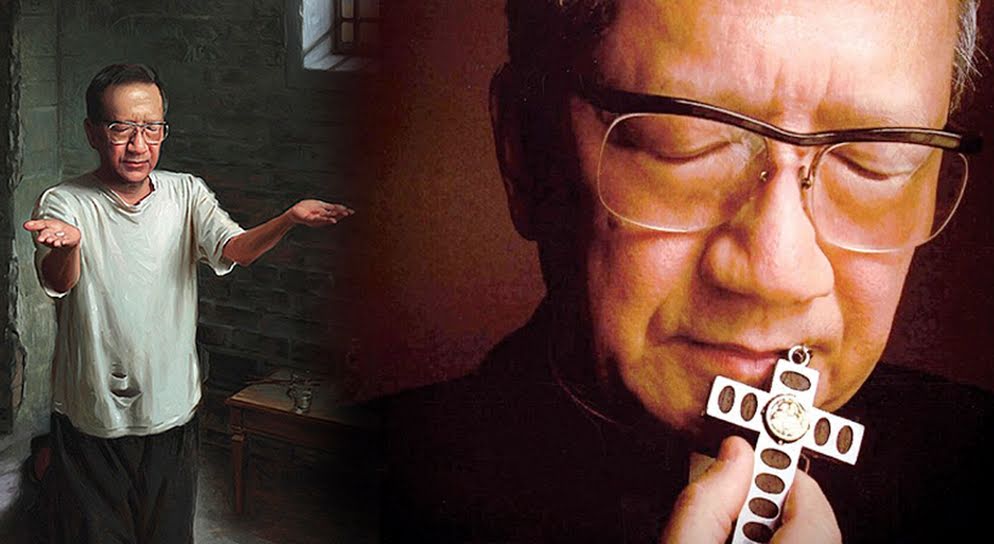
Venerable Francis-Xavier Nguyễn Văn Thuận was a prisoner of war, a cardinal, and a source of inspiration for the Vietnamese faithful worldwide. Francis-Xavier Nguyễn Văn Thuận was born in 1928 near Huê´, then the imperial capital of Vietnam.
HAPPY AND DEVOUT CHILDHOOD
His parents were Nguyễn Văn ´m and Elizabeth Ngô Ðình Thị Hiệp, a prominent family in Vietnam. One of his uncles was the first president of South Vietnam, and another was the Archbishop of Huê´. The roots of the Catholic faith ran deep in Francis-Xavier’s family, dating to the seventeenth century. Some family members were martyred for the Faith, and their memory was kept alive by his mother, Elizabeth. He was the oldest of eight children, and they were raised with daily studies of the Scriptures and the saints lives. He recognized a call to the priesthood after attending a Eucharistic Crusade event. He entered minor seminary as a young teen and later earned his degrees in philosophy and theology at the major seminary at Phu Xuan.
ORDINATION AND FRUITFUL MINISTRY
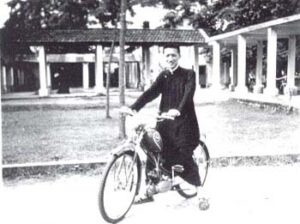
He was ordained in June of 1953 at age twenty five and was assigned to a parish where both Vietnamese and French were spoken, and then as a hospital and prison chaplain. Shortly thereafter, his bishop assigned him to study in Rome, where he spent three years. In 1959, he earned his doctorate in Canon Law and returned to Vietnam.
Father Văn Thuận was assigned to teach at a seminary in Huê´ and also became the seminary rector. From 1964 to 1967, he served as vicar general of the Huê´ archdiocese.
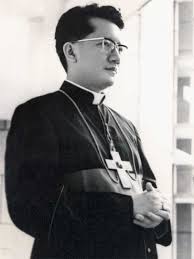
In the spring of 1967, he was named Bishop of Nha Trang, a coastal city in South Vietnam. He served in this capacity for eight years, and the fruits of his work were impressive. He implemented adult education for laity as well as youth ministries, supported such lay movements as Cursillo and Focolare, and co-founded the Catholic “Radio Veritas” station, based out of Manila. He met with Cracow, Poland Archbishop Karol Wojtyła (the future Pope John Paul II) to learn about pastoral ministry under Communist oppression, which was a threat to South Vietnam. A member of the Congregation for Divine Worship and the Discipline of the Sacraments, he was asked to supervise several seminaries in Africa. Most notably, more than seven hundred men were in priestly formation at the end of his tenure. This occurred in the midst of a civil war that exploded into an international conflict, in addition to it being a time in history when the post Vatican Council II Church was undergoing a widespread exodus from the priesthood and religious life.
IMPRISONMENT AND EXILE
In April of 1975, Bishop Văn Thuận was named Coadjutor Bishop of Saigon, the capital of South Vietnam, giving him the right of succession at the next vacancy. Seven days later, Saigon fell to the Communist North Vietnamese. The Communists saw the appointment of such a popular bishop as Vatican involvement to resist the Communist takeover, and when he arrived in May, they forced him to return to Nha Trang. He was arrested, and without benefit of a trial, taken to North Vietnam the following spring, where he was imprisoned in a “re-education camp”. He spent the next thirteen years of his life as a prisoner, nine of which were solitary confinement. Determined to continue serving his people, he used his very limited resources for good. He asked a delivery boy to bring him calendars, which he tore into small pieces and used to write brief messages of hope to the faithful. The boy copied the messages and spread them among the faithful, messages which greatly helped them to endure under oppression as the Vietnamese faithful had had to do in previous periods of persecution. The lay leaders that he himself had formed at Nha Trang assembled the messages and printed them as Duong Hy Vong or The Road To Hope. Some of his guards slipped in some wire and wood for him to make a crucifix, and he offered Mass each day using his hand as an altar, small amounts of smuggled hosts and wine, and reciting the Missal from memory. He successfully taught and evangelized his guards, to the point that they were replaced regularly. In 1988, the bishop was finally released from prison, but kept under house arrest in Hanoi.
ALWAYS A PASTOR
In 1991, he was allowed to travel to Rome, but not allowed to return. In 1994, he was appointed President of the Pontifical Council for Justice and Peace, and he worked diligently to support the faith and culture of Vietnam. Having mastered at least five languages, he became a popular speaker in numerous countries.
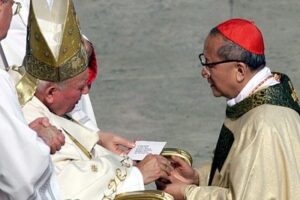
In 2000, he gave the Lenten retreat for the Roman curia, and in 2001, was named a cardinal. He died of cancer September 16, 2002 at age seventy-four.
Cardinal Francis-Xavier Nguyễn Văn Thuận always had the heart of a pastor and teacher, as shown by his fervent evangelization efforts to even his prison guards. He saw his time of imprisonment as Christ’s gift for him, and he lived his fatherly ministry in extraordinarily difficult circumstances. He was mentioned in Pope Benedict XVI’s 2007 encyclical Spe Salvi for his example of hope. His book The Road To Hope, has been translated into numerous languages and continues to inspire.
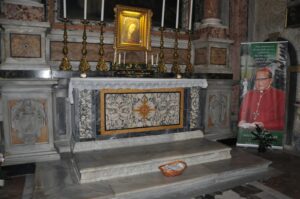
His remains are interred at the Santa Maria della Scala in Rome, and he was declared “Venerable” in 2017, indicating that he lived a life of heroic virtue. His cause for canonization continues.
